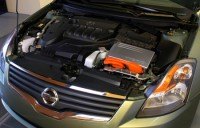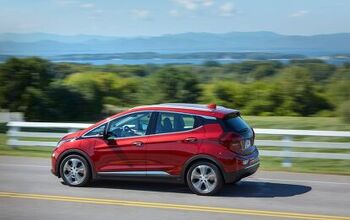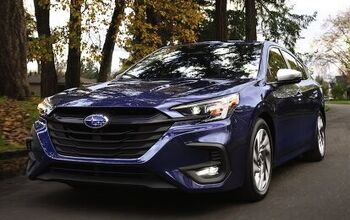Nissan Hybrid, EV and FCV Systems "Previewed"
Nissan has decided that using Toyota powertrains in its Altima hybrid is a bit embarrassing. So they're working on one of their own. If CNet is to be believed, "Nissan's system is designed for a rear-wheel-drive car, and uses two clutches, doing away with a torque converter for more efficient power use." That's right sports fans, he said rear-wheel-drive. But before the hybrid Z-car rumors get out of control, consider that "Nissan hasn't released any details on performance yet, or when it might offer a car with this technology." Mes anwhile, they're charging ahead with Li-ion EVs, apparently. PC World reports that "Nissan has committed to launch its first all-electric car in the U.S. and Japan in 2010 and to mass market the vehicle globally by 2012." The latest prototype is a version of Nissan's Cube. PC World got to take the 80kw beast out on the track. The verdict? "On the test track it easily got up to a speed of 100 kilometers per hour." Breathtaking. But wait there's more! Nissan also has a new fuel cell stack that is smaller and lighter than previous models. And it uses half the platinum of previous fuel cells (a development that'll likely alienate literally hundreds of DUB readers from the green movement). While it's nice of Nissan to remind us that technology marches on, it's no substitute for a here-and-now hybrid system. Y'know, like the one they buy from Toyota.
More by Edward Niedermeyer


































Comments
Join the conversation
I think they should put the hybrid in the QR25DE four-cylinder and offer it in the Sentra and the Frontier XE. It would give both cars a leg up in their vehicle classes.
I'd pay cash in full for an electric Versa tomorrow if it was available. How many ounces of platinum are in this new and improved cell? Until they take platinum out of the fuel cell design, these things will always cost millions of dollars. If your hydrogen fuel cell car gets 24 mpg and hydrogen costs $5/gal from the local Shell station; are you still interested? The oil companies are going to make this hydrogen from natural gas you know? Sure; the first generation of electrics will have small packs(cheaper); hence less range. But once production ramps up and they start to put some serious packs in them; what if it got like 1,000 miles per charge? People are terrified of getting stranded for some reason. It's no different then running out of gas. You watch your fuel gauge; the EV's will have a charge indicator. If your first EV gets 80 miles per charge and your going somewhere that is 10 or 20 miles away; you'll make it back. You know how far your work commute is. When you get your EV for commuting/errands; you'll still own your other four or five gas powered vehicles. Your nice weekend car, your old beater, an expensive SUV that's worth nothing now, and a full size work truck. If you have to drive out of state or across the country; you can still do that. If anyone brings up the whole pollution argument: I can either drive my 20 mpg gas burning car to work every day, or I can drive this electric to work that isn't burning all that fuel and isn't polluting the air. You point out the power plants, but they are going to be powered up and running anyways. Tires and brake pads. About all that will wear out on the EV. I'm going to get a faster/sportier EV before the pack needs replaced. Consider it like a vehicle needing a new engine.
@rtz How many ounces of platinum are in this new and improved cell? Until they take platinum out of the fuel cell design, these things will always cost millions of dollars. Funny, that's what they said about catalytic converters when they were new. They still contain platinum and don't cost millions of dollars.
@rtz You point out the power plants, but they are going to be powered up and running anyways. Rediculously faulty logic. That's like saying the gas you get for your car would be burned anyways. Powerplants, to produce additional electricity from coal, etc. for your car, will OBVIOUSLY produce additional pollution. It's very easy to see a very linear relationship. I'm excited for ANY kind of RWD hybrid! Woot! @Niedermeyer While it's nice of Nissan to remind us that technology marches on, it's no substitute for a here-and-now hybrid system. So they should spend time and money developing a hybrid system like the one a competitor has already developed? Let's not forget that Toyota's hybrid system is many years in the making...they didn't get there by following in competitors' footsteps. The technologies rumored in your news article look quite interesting and promising, however. Maybe a next-gen EV Cube (hopefully with a higher top speed) is on the horizon...and maybe for the U.S.??